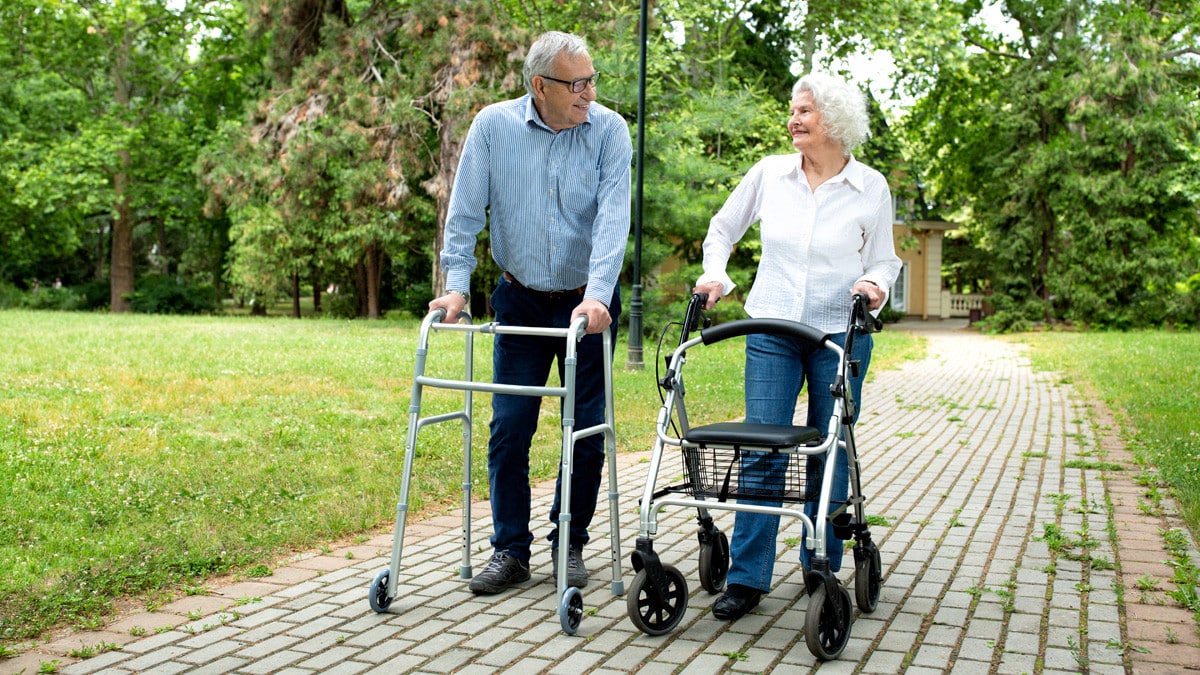Key Points
-
Low weight puts seniors at risk of health complications.
-
Healthy weight gain for elderly people requires a diet with a balance of nutrients.
-
Exercise, a healthy diet, and nutritional supplements support healthy weight gain for the elderly.
-
Common illnesses, social factors, and medications can cause loss of appetite and low weight in seniors.
Malnutrition doesn’t only happen to seniors who suffer from hunger or who don’t have access to nutritious food. Healthy weight gain for the elderly is a challenge for many people as they age.
Malnutrition among seniors is far more common than you might think. Up to twenty percent of seniors experience unintentional weight loss, and more than half of people in hospitals and nursing homes have malnutrition. Healthy weight gain for the elderly is a key part of aging well.
A good diet in your later years reduces your risk of health conditions like osteoporosis, high blood pressure, heart diseases, and certain cancers. Learn how to gain weight effectively and healthily with this in-depth guide.
What Is Low Weight in an Elderly Person?
Dangerously low weight in the elderly is usually defined as a body mass index (BMI) of less than 18.5. BMI consists of your weight in kilograms (or pounds) divided by the square of height in meters (or feet). BMI screens for body weight that may lead to health problems.
Your rate of weight loss is also a concern. If you lose 5-10 percent of your body weight in six months, this warrants a visit to your medical provider. "For many people in their seventies, eighties, and beyond, weight loss may be the first sign of a health problem," says Dr. Paul Takahashi, M.D., who practices primary care internal medicine at the Mayo Clinic in Rochester, Minnesota.
Rapid weight loss is sometimes a sign of end-stage disease or indicates a poor prognosis. However, weight loss alone is not the only measure of well-being since many factors affect your health and life expectancy.
The amount of weight an elderly person can lose before being at risk of death depends on factors like overall health status, underlying medical conditions, and the level of care they receive.
Risks of Low Weight for Seniors
Because social standards focus on losing weight and being slim, weighing too little doesn't always seem like a problem. However, low weight poses a serious risk for seniors, especially when accompanied by malnutrition.
Low weight puts seniors at risk of numerous complications such as:
-
Infections due to a weakened immune system
-
Muscle wasting and weakness and increased risk of falls and fractures
-
Poor wound healing, pressure ulcers, infections, and chronic non-healing wounds
-
Increased risk of hospitalization and the likelihood of a poor outcome if you're in the hospital
-
Decreased cognitive function like impaired speech, coordination, and memory
-
Increased risk of mortality, especially for those with chronic illnesses
-
Deficiencies in protein, vitamins, and minerals
-
Compromised independence and quality of life due to the decline in health and functioning
Causes of Being Underweight
If you find that you're underweight or losing weight rapidly, it’s important to identify the cause in order to treat it properly. There are several potential causes of low weight in seniors.
Reduced Appetite
A loss of appetite could be due to disease, a decreased need for energy, or changes to your digestion, hormones, or sense of smell, taste, or vision. Some medications, like chemotherapy drugs or appetite suppressants, can reduce your appetite.
Psychosocial and Environmental Factors
Sometimes it's hard to get to the store. When you do, you find that healthy foods are too expensive. Changes in mobility or cognitive function make cooking difficult. Plus, your mood and mental state can affect your appetite and behavior. You may experience profound changes like isolation, loneliness, and depression.
Chronic Illnesses
Illnesses like cancer, chronic obstructive pulmonary disease, and digestive disorders are more common as you age and can lead to weight loss.
Difficulty Chewing and Swallowing
Swallowing problems are usually caused by other health conditions like stroke, head injury, multiple sclerosis, or dementia. Cancer of the mouth or gastroesophageal reflux disease may also impact your ability to swallow. Missing teeth, poorly fitted dentures, and mouth pain are common reasons why older people have problems chewing.
How To Gain Weight
Trying to gain weight probably sounds like fun if you’ve always struggled to reduce your weight. Gaining weight, however, is equally difficult.
Gaining weight after age 65 requires a combination of a balanced diet and regular exercise. Implement these tactics to gain weight in a healthy way.
Increase Calorie Intake
Try to consume more calories than you burn every day. Choose foods that are dense in nutrients, like nuts, seeds, avocados, whole grains, lean proteins, and healthy fats. If you don’t feel hungry, eat smaller, more frequent meals throughout the day.
An extra 500 calories per day helps you gain weight at a healthy one pound per week. Online calorie counters on your computer or smartphone make it simple to track your calories.
Focus on Protein-Rich Foods
You need protein to build and maintain muscle mass, which you naturally lose with each year that passes. Choose protein-rich foods like lean meats, fish, eggs, dairy, legumes, and nuts.
Exercise
Even if you have limited mobility or suffer from an illness, add as much physical activity throughout your day as possible. Include strength exercises to build muscle mass and increase your appetite.
Manage Stress
Chronic stress affects your mood, appetite, and health, and it can contribute to weight loss in seniors. Use relaxation techniques like meditation or yoga to promote your peace of mind.
Support Your Diet With Supplements
If you can’t eat enough food to meet your nutrient needs, fill in the gaps with nutritional supplements like protein drinks or multivitamins. Whey powder, protein bars, or high-protein shakes make it easier for seniors to maintain and increase muscle mass and body weight.
Foods for Weight Gain
Foods that facilitate healthy weight gain pack a lot of nutrients and calories into small portions without excess sugars or fats.
These nutrient-dense foods add the pounds you need in a healthy way:
-
Nuts and nut butters are high in healthy fats, protein, and calories. Enjoy a handful as a snack, or add nut butter to toast, oatmeal, or smoothies.
-
Avocados are rich in healthy fats. Their smooth flavor is a delicious addition to sandwiches, salads, and smoothies.
-
Whole grains like brown rice, whole grain bread, and quinoa retain all of their healthy fiber and complex carbohydrates to give you sustained energy and essential nutrients.
-
Lean proteins like fish, eggs, dairy, legumes, and nuts help you build and maintain muscle mass, an important component of weight gain.
-
Full-fat dairy products like whole milk, yogurt, and cheese are high in calories and protein. Include them in meals or enjoy them as a convenient snack.
-
Dried fruit is high in calories and fiber. Add it to oatmeal or yogurt, or enjoy it in trail mix for a healthy snack.
-
Use healthy fats like olive oil, coconut oil, or avocado oil when cooking, or add sliced avocado or nuts to meals.
Supplements for Weight Gain
Protein supplements support weight gain by increasing your protein and calorie intake and promoting muscle growth. They're convenient and easy to consume, especially if you have difficulty chewing or swallowing. Supplements also defend against weight loss and malnutrition.
Try one of the following delicious protein supplements to aid in building muscle and gaining weight.
MuscleTech 100% Mass Gainer Protein Powder
MuscleTech 100% Mass Gainer Protein Powder contains high-quality protein and mass-producing calories, plus muscle-builder creatine monohydrate. The high-quality protein and easily digestible carbs deliver 1,500 clean calories when mixed with two cups of skim milk. 100% Mass Gainer only uses pure HPLC-tested creatine, which replenishes ATP stores in the body for enhanced performance, muscle, and strength.
Optimum Nutrition Serious Mass Weight Gainer Protein Powder
Chocolate-flavored Optimum Nutrition Serious Mass Weight Gainer Protein Powder contains vitamin C, zinc, and vitamin D to provide immune support, along with vitamin E. It offers 1,250 calories, 50 grams of protein, and over 250 grams of carbohydrates per two-scoop serving. You get 25 vitamins and minerals plus creatine and glutamine.
Using an electric blender to add fresh or frozen fruit, peanut butter, nuts, and other calorie-dense foods boosts your weight gain potential.
Naturade Weight Gain Instant Nutrition Drink Mix
All-natural, vanilla-flavored Naturade Weight Gain Instant Nutrition Drink Mix amplifies your caloric intake with 21 grams of carbohydrates, nine grams of protein, and 1600 calories per serving.
Naked Mass Natural Vegan Weight Gainer Protein Powder
Naked Mass Vegan Weight Gainer Protein Powder is GMO-free, gluten-free, soy-free, and dairy free. It has no artificial ingredients and each serving of unflavored vegan weight gainer powder contains 50 grams of protein, 248 grams of complex carbohydrates, 1,230 calories, and 10.3 grams of branched-chain amino acids.
Dymatize Super Mass Gainer Protein Powder
With 1310 calories, 52 grams of protein, and 245g carbs per serving, Dymatize Super Mass Gainer Protein Powder adds weight for even the hardest gainers. It contains a blend of fast, medium, and slow-digesting proteins for muscle support, plus 17 vitamins and minerals to support balanced nutrition, healthy muscle tissue, and muscle recovery. Enjoy gourmet vanilla or rich chocolate flavors.
Healthy Weight Gain Puts You on Track for Good Health
Despite the challenges for seniors who are trying to gain weight, the benefits are profound. A healthy weight and a nutritious diet improve your quality of life.
Add nutrient-dense foods to your diet and try some of the delicious supplements that meet your nutritional needs.
Subscribe to Gold Years for more on healthy aging.








